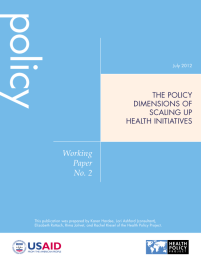The Health Policy Project ended in 2016. Work continued under Health Policy Plus (HP+) until 2022.
PUBLICATION
Author(s): Karen Hardee
Primary Language: English
Date: 3/7/2012
Abstract:
Adopting new practices in health on a large scale requires systematic approaches to planning, implementation, and follow-up, and often calls for profound and lasting changes in health systems. Without attention to the policies that underlie health systems and health services, the scale-up of promising pilot projects is not likely to succeed and be sustained. Because of the urgency to rapidly expand effective interventions to improve the health of mothers, children, and families, particularly the poor and underserved, there exists a growing interest in scale-up among the international public health community and others involved in health policy and programs.
To explore best practices and guide the scale-up of these practices, the Health Policy Project (HPP) reviewed the literature on scale-up, interviewed key experts involved in scaling up initiatives, and hosted a meeting on relevant policy and gender issues. This paper focuses on efforts to scale up interventions in family planning (FP) and reproductive health, and maternal, neonatal, and child health (MNCH) in developing countries. It defines “scale-up” and describes some of the frameworks and approaches to scale-up found in recent health literature and how such approaches address policy. The paper, developed with support from the U.S. Agency for International Development, also reviews the experience of selected organizations in scaling up best practices and how they have addressed policy issues. It identifies a number of lessons learned from scale-up initiatives and lists six recommendations for ensuring supportive policies to strengthen scale-up.
Related resources:
Advocacy Best Practices Family Planning/Reproductive Health (FP/RH) Governance, Stewardship & Accountability (GS&A) Maternal Health Policy Report Scale-up Stakeholder Engagement Working Papers AME Region


